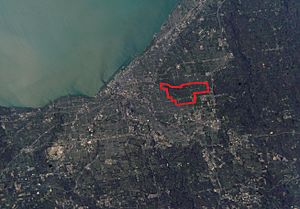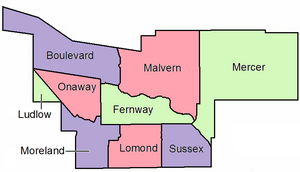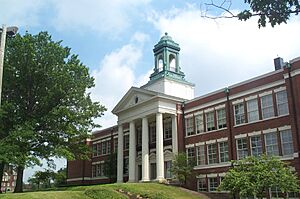Shaker Heights, Ohio facts for kids
Quick facts for kids
Shaker Heights, Ohio
|
|
|---|---|
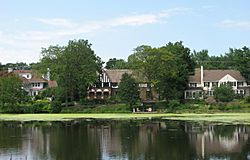
Shaker Village Historic District
|
|
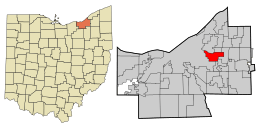
Location in Cuyahoga County and the state of Ohio.
|
|
| Country | United States |
| State | Ohio |
| County | Cuyahoga |
| Established | 1911 |
| Incorporated | 1912 |
| Area | |
| • Total | 6.33 sq mi (16.40 km2) |
| • Land | 6.29 sq mi (16.29 km2) |
| • Water | 0.04 sq mi (0.11 km2) |
| Elevation | 1,050 ft (320 m) |
| Population
(2020)
|
|
| • Total | 29,439 |
| • Density | 4,679.54/sq mi (1,806.68/km2) |
| Time zone | UTC-5 (Eastern (EST)) |
| • Summer (DST) | UTC-4 (EDT) |
| ZIP codes |
44118, 44120, 44122
|
| Area code(s) | 216 |
| FIPS code | 39-71682 |
| GNIS feature ID | 1065308 |
| Website | www.shakeronline.com |
Shaker Heights is a city in Cuyahoga County, Ohio, United States. It's located right next to Cleveland. In 2020, about 29,439 people lived there.
Shaker Heights is known as a "streetcar suburb." This means it was built along streetcar lines, making it easy for people to travel to and from Cleveland. It was also a "planned community," meaning it was carefully designed from the start. Two brothers, M.J. and O.P. Van Sweringen, created it as a peaceful place away from the busy city.
Contents
A Look Back in Time

Shaker Heights is home to the oldest house in Cuyahoga County, built in 1817. The city's name comes from two things. First, the land used to belong to a religious group called the Shakers. They were officially known as the "United Society of Believers in Christ's Second Appearing."
Second, "Heights" refers to how high the land is. Shaker Heights sits on a plateau (a flat area of high ground) that rises sharply east of Cleveland. It's about 1,050 feet (320 meters) above sea level.
The Shaker Community
The North Union Shaker Settlement was started in 1822 by Ralph Russell. It began with just over 80 people. Between 1826 and 1854, the Shakers built dams on Doan Brook, creating Upper and Lower Lake. They also built three gristmills (for grinding grain) and a sawmill (for cutting wood).
The Shaker community grew to about 300 people around 1850. However, the group slowly became smaller and eventually closed in 1889.
How Shaker Heights Was Planned
In 1905, the Van Sweringen brothers bought the land. They dreamed of creating Ohio's first "garden styled suburb." This meant designing a community with lots of green spaces and a beautiful layout.
The brothers built homes, set aside land for churches and schools, and planted many trees. The area was first called Shaker Village. It officially became a town in 1912 and a city in 1931.
Shaker Heights is famous for its strict building codes and zoning laws. These rules help keep the homes and neighborhoods looking nice and maintain the city's unique style. About 75% of Shaker Heights is listed on the National Register of Historic Places as the Shaker Village Historic District. This means it's recognized as an important historical area.
Working Together for Everyone
Starting in the late 1950s, people in Shaker Heights worked to make the community welcoming for all races. Neighbors in the Ludlow Elementary School area especially worked together to make integration successful.
Because of these efforts, Shaker Heights avoided many problems seen in other cities. In 1986, the city started the Fund for the Future of Shaker Heights. This program offered loans to help people buy homes in different neighborhoods, creating mixed-ethnic communities. Today, the city still has a housing office that helps people buy homes and keep neighborhoods integrated.
In 1989, Shaker Heights was a finalist for the All-America City Award. This award recognizes communities that work together to solve problems.
Where is Shaker Heights?
Shaker Heights is located at 41°28′35″N 81°33′6″W / 41.47639°N 81.55167°W. The city covers about 6.32 square miles (16.4 square kilometers). Most of this area is land, with a small part being water.
The city is about 1,050 feet (320 meters) above sea level. It's also about 6 miles (10 kilometers) inland from Lake Erie. Water flows through Shaker Heights as part of the Doan Brook watershed.
There are several small artificial lakes in the city:
- Horseshoe Lake
- Green Lake
- Lower Shaker Lake
- Marshall Lake
The Shakers built dams to create Horseshoe Lake and Lower Shaker Lake. Later, developers added Green Lake and Marshall Lake.
Shaker Heights is one of Greater Cleveland's older "inner-ring" suburbs. These are the first suburbs built around a main city. It borders several other cities, including Cleveland, Cleveland Heights, University Heights, Beachwood, Highland Hills, and Warrensville Heights.
City Neighborhoods
Shaker Heights has nine neighborhoods. Each one is named after one of the original elementary schools. Here are the neighborhoods:
- Boulevard: Located in northwest Shaker Heights, near Cleveland's University Circle. The Nature Center at Shaker Lakes is here.
- Fernway: In the middle of Shaker Heights, north of Van Aken Boulevard.
- Lomond: In the south-central part of the city.
- Ludlow: The smallest neighborhood, in the western part of the city. Part of it is in Cleveland, but it's still part of the Shaker Heights School District.
- Malvern: Mostly homes. Hathaway Brown School is located here.
- Mercer: In northeast Shaker Heights and the largest neighborhood. It's home to Shaker Heights Middle School, University School, and Laurel School.
- Moreland: In southwest Shaker Heights. The main branch of the Shaker Heights Public Library is in the old Moreland school building.
- Onaway: Home to Shaker Heights High School.
- Sussex: In the southeast part of the city. The Tower East office building and post office are here.
Shaker Square is technically in Cleveland, but its schools are part of the Shaker Heights City School District.
Who Lives in Shaker Heights?
| Historical population | |||
|---|---|---|---|
| Census | Pop. | %± | |
| 1920 | 1,616 | — | |
| 1930 | 17,783 | 1,000.4% | |
| 1940 | 23,393 | 31.5% | |
| 1950 | 28,222 | 20.6% | |
| 1960 | 36,460 | 29.2% | |
| 1970 | 36,306 | −0.4% | |
| 1980 | 32,487 | −10.5% | |
| 1990 | 30,831 | −5.1% | |
| 2000 | 29,405 | −4.6% | |
| 2010 | 28,448 | −3.3% | |
| 2020 | 29,439 | 3.5% | |
| U.S. Decennial Census | |||
In 2010, about 28,448 people lived in Shaker Heights. The city has a mix of different people. About 55% of residents were White, 37.1% were African American, and 4.6% were Asian. About 2.2% of the population was Hispanic or Latino.
The average age in the city was 40.9 years. About 26.7% of residents were under 18 years old. Most people in Shaker Heights (about 93.5%) speak English at home. Other languages spoken include Spanish, French, and Chinese.
Many people in Shaker Heights have a college degree. In 2010, about 64.5% of adults over 25 had a college degree. This is much higher than the average for Ohio and the United States.
Learning and Schools
Shaker Heights has a strong public school system, the Shaker Heights City School District. It serves students from kindergarten through 12th grade, with about 5,600 students. The district has eight schools:
- Five lower elementary schools: Fernway, Mercer, Boulevard, Lomond, and Onaway.
- An upper elementary school: Woodbury Elementary School.
- Shaker Heights Middle School.
- Shaker Heights High School.
About 90% of Shaker Heights graduates go on to college. The district is known for its efforts to help neighborhoods become more integrated. In the 1950s, the public school system was ranked among the top ten nationally.
Many students at Shaker Heights High School receive National Merit Scholarship awards. In 2008, the high school had twice as many winners as any other public school in Ohio.
Private Schools and Universities
Shaker Heights also has several private schools:
- Laurel School
- Hathaway Brown School
- The lower campus of University School
- St. Dominic School (a parochial school)
John Carroll University is partly located in Shaker Heights. The city is also close to University Circle in Cleveland. This area is home to Case Western Reserve University, The Cleveland Institute of Art, and the Cleveland Institute of Music.
The Japanese Language School of Cleveland holds its classes at the Laurel School's Shaker Heights campus.
News and Media
Shaker Heights is where the TV station WOIO, channel 19 (a CBS affiliate), is licensed. Its studios are in Cleveland.
News about Shaker Heights appears in Cleveland's daily newspaper, The Plain Dealer. Students at Shaker Heights High School publish their own newspaper, The Shakerite. The Sun Press is a weekly newspaper that covers local news for Shaker Heights and nearby cities.
Getting Around
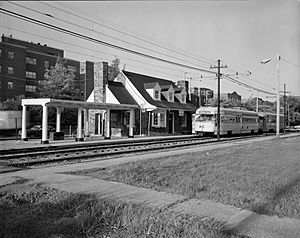
Two light rail lines run through Shaker Heights, part of the GCRTA system. These lines are like modern streetcars.
- The Blue Line runs down the middle of Van Aken Boulevard.
- The Green Line runs down the middle of Shaker Boulevard.
Both lines offer direct train service to Cleveland. They are the modern versions of older streetcar services that started in 1920 and 1913. The city of Shaker Heights used to own and operate these services, known as Shaker Heights Rapid Transit, from 1944 to 1975.
Notable People
See also
 In Spanish: Shaker Heights para niños
In Spanish: Shaker Heights para niños


